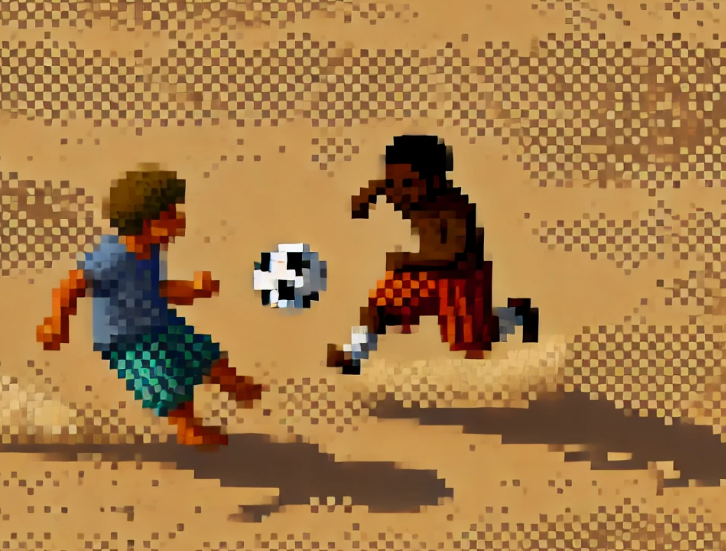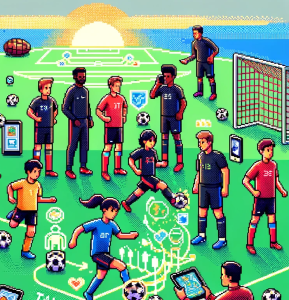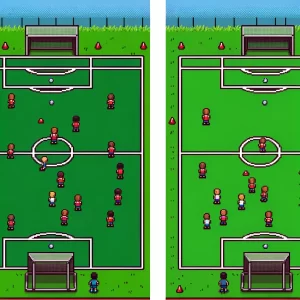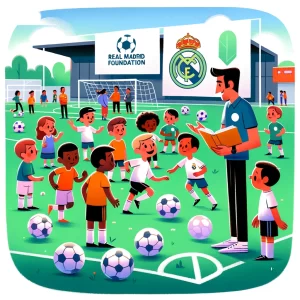
How Soccer Boosts Young Minds and Focus
Imagine a group of five-year-olds dribbling and dodging on a soccer field. In my house, we call this “Wednesday night”. Each child is learning to focus amidst the chaos of teammates, opponents, and the elusive ball. Soccer, it turns out, is more than just a game for these kids—it’s a powerful tool for enhancing their mental skills and readiness for school. According to a recent study, introducing children to soccer improves an essential mental skill called inhibition—the ability to control impulses and make thoughtful decisions.
But how does running around a field improve focus? The answer lies in the brain’s executive functions, which help with memory, attention, and self-control—abilities critical for success in school and life. Soccer, classified as an “open-skill” sport, demands these abilities more than most sports, making it an exciting focus for researchers studying childhood development.
What This Study Explored
This study zeroed in on whether learning soccer can improve two key skills in young children: agility and inhibition. Agility is about physical quickness and the ability to change directions swiftly. Inhibition, on the other hand, is a cognitive skill that helps us control impulses—think of it as the mental muscle that lets us pause before acting.
For the study, researchers observed 31 five-year-olds who learned soccer over 12 weeks. These kids had no previous experience with soccer or other similar sports. A control group of 39 children who engaged in regular indoor activities like drawing or reading was also monitored for comparison. Over the study period, the soccer group’s inhibition levels improved significantly compared to the control group. Interestingly, their agility and working memory didn’t show the same jump, suggesting that some skills might take longer to develop or need different types of training.
How Soccer Sharpens the Mind
So, why did inhibition improve? Soccer is an “open-skill” sport, meaning the play environment changes constantly. Players must adapt quickly to new situations—like responding to an opponent’s sudden move or deciding between passing or dribbling. Such unpredictable changes train the brain to process information fast, inhibit impulsive responses, and act deliberately.
In soccer, players continuously analyze their surroundings: where is the ball, who is nearby, and what’s the best next move? This mental workout directly influences inhibition. Young players aren’t just running after a ball—they’re learning to control their impulses, filter distractions, and make choices. The study’s findings are exciting because they suggest that something as enjoyable as a soccer game can prepare young kids for the classroom, where they’ll need to sit still, focus, and resist the urge to speak out of turn.
Why Working Memory and Agility Weren’t Affected
The researchers also examined working memory and agility but found no significant improvement in these areas. Working memory allows kids to hold and manipulate information mentally, like remembering the rules of a game while playing. Although soccer demands awareness of the ball and other players, young beginners are often focused on simply following the ball, limiting their capacity to process everything around them.
As for agility, while soccer is a physically demanding sport, controlling a ball with feet rather than hands presents unique challenges, especially for beginners. Unlike older players who can maneuver the ball skillfully, five-year-olds are just learning the basics, which might explain why they didn’t show noticeable agility gains after 12 weeks.
Applications: Bringing Soccer into Early Education
This study offers valuable insights for coaches, educators, and parents looking to foster critical life skills in children. Below are some practical ways to apply these findings to coaching and child development:
- Incorporate Soccer into Kindergarten Programs: Soccer isn’t just a physical activity—it’s a mental one, too. Incorporating short, playful soccer sessions into early childhood programs can help children develop essential self-control skills they’ll use in the classroom.
- Focus on Fun Over Skill Mastery in Early Stages: For young children, the fun of soccer should come before skill development. Coaches should emphasize playful engagement with the ball, helping kids enjoy the sport while naturally strengthening their inhibition through quick decision-making.
- Make Self-Control a Game Within the Game: Set up drills that encourage kids to pause and think. For example, a coach might introduce a rule where players must stop dribbling and switch direction when a whistle blows. This “stop-and-go” style of play sharpens inhibition while keeping kids active.
- Encourage Parents to Support Open-Skill Activities: Open-skill sports like soccer are unique because they engage both mind and body in dynamic ways. Parents can look for programs that offer such sports, as these help develop cognitive skills linked to school readiness.
- Set Realistic Goals for Physical Skills in Young Players: Building agility and ball control takes time, so while inhibition improvements are exciting, don’t expect immediate boosts in physical performance from young players. Coaches can reassure parents that while their child may not seem more agile yet, the mental gains are happening beneath the surface.
The Big Picture: How Soccer Prepares Kids for School
Executive function skills, especially inhibition, are a cornerstone of childhood development. They’re the abilities that help kids pay attention, follow instructions, and manage emotions—all necessary skills for thriving in school. Soccer, with its blend of fun and mental challenge, turns out to be an excellent way to boost these skills early on. While further studies are needed to understand how soccer might improve other aspects like agility and working memory, this research highlights that the game can strengthen the foundational cognitive skills kids will need as they enter more structured learning environments.
In short, soccer isn’t just a sport for these kids; it’s a playground for the mind, where each game hones their ability to think quickly, stay calm under pressure, and make smart decisions. For parents, coaches, and educators, this research is a reminder of the simple power of play—and how, sometimes, the best preparation for a child’s future starts with a ball, a field, and a few enthusiastic teammates.
Are you ready to delve deeper into the science and strategy of soccer?
This Week in Soccer offers you a unique blend of expert analysis, engaging infographics, and practical insights. Subscribe to our newsletter and stay ahead of the game with the latest in soccer analytics and coaching strategies. Make the move from spectator to strategist. Subscribe now!



